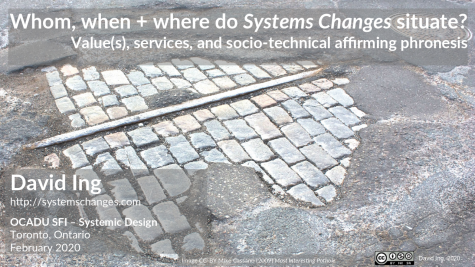The 1995 article by Spinosa, Flores & Dreyfus on “Disclosing New Worlds” was assigned reading preceding the fourth of four lectures for the Systemic Design course in the Master’s program in Strategic Foresight and Innovation at OCAD University. In previous years, this topic was a detail practically undiscussed, as digging into social theory and the phenomenology following Heidegger is deep. Peter Jones and I are fans of ideas expanded into the 1999 book. I was privileged to visit personally with Fernando Flores in Berkeley in 2012, as I was organizing the ISSS 2012 meeting. Contextualizing this body of work for a university course led into correlated advances in situated learning and communities of practice.
A preface to the lecture included The Practice Turn in Contemporary Theory, and revisiting Change as Three Steps to clarify what Kurt Lewin did and did not write.
The agenda was in four sections. In the timebox available, the lecture covered the first two:
- A. Situated Learning + History-making
- Legitimate Peripheral Participation + Practices (Lave, Wenger)
- Skill Acquisition + Disclosing New Worlds (Dreyfus, Spinosa)
- B. Commitment + Language-Action Perspective
- Conversations for Action (Flores)
- Deliverables, procedures, capacities, relationships
Slides for the last two sections were ready to go, but foregone in favour of other course work priorities.
- C. Argumentation + Pattern Language
- IBIS (Rittel), Timeless Way of Building (Alexancer)
- Architectural Programming c.f. Designing
- [postscript] (Open Innovation Learning)
- Quality-generating sequencing; Affordances wayfaring; Anticipatory appreciating
- Innovation learning for; Innovation learning by; Innovation learning alongside
This fourth lecture is available on Youtube as streaming web video.… Read more (in a new tab)
The 1995 article by Spinosa, Flores & Dreyfus on “Disclosing New Worlds” was assigned reading preceding the fourth of four lectures for the Systemic Design course in the Master’s program in Strategic Foresight and Innovation at OCAD University. In previous years, this topic was a detail practically undiscussed, as digging into social theory and the phenomenology following Heidegger is deep. Peter Jones and I are fans of ideas expanded into the 1999 book. I was privileged to visit personally with Fernando Flores in Berkeley in 2012, as I was organizing the ISSS 2012 meeting. Contextualizing this body of work for a university course led into correlated advances in situated learning and communities of practice.
A preface to the lecture included The Practice Turn in Contemporary Theory, and revisiting Change as Three Steps to clarify what Kurt Lewin did and did not write.
The agenda was in four sections. In the timebox available, the lecture covered the first two:
- A. Situated Learning + History-making
- Legitimate Peripheral Participation + Practices (Lave, Wenger)
- Skill Acquisition + Disclosing New Worlds (Dreyfus, Spinosa)
- B. Commitment + Language-Action Perspective
- Conversations for Action (Flores)
- Deliverables, procedures, capacities, relationships
Slides for the last two sections were ready to go, but foregone in favour of other course work priorities.
- C. Argumentation + Pattern Language
- IBIS (Rittel), Timeless Way of Building (Alexancer)
- Architectural Programming c.f. Designing
- [postscript] (Open Innovation Learning)
- Quality-generating sequencing; Affordances wayfaring; Anticipatory appreciating
- Innovation learning for; Innovation learning by; Innovation learning alongside
This fourth lecture is available on Youtube as streaming web video.… Read more (in a new tab)



